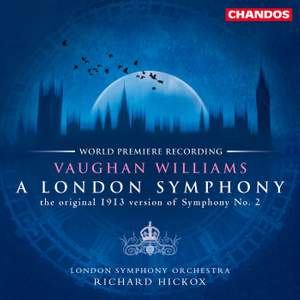Special offer. Vaughan Williams: A London Symphony
original 1913 version
London Symphony Orchestra, Richard Hickox
Hickox and the London Symphony Orchestra have come up with a recording that you can cheerfully measure against most others in the catalogue, before you consider its unique extra charms! — More…
-
Presto Recording of the Week1st December 2008
-
Gramophone MagazineJuly 2001Editor's Choice
-
Penguin GuideRosette
CD
Original price ($17.00) Reduced price $13.94Contents
Butterworth, G: The Banks of Green Willow
Work length6:17
$1.00
$1.30
$1.60
- Richard Hickox, London Symphony Orchestra
Vaughan Williams: Symphony No. 2 'A London Symphony'
Work length1:01:27
$15.00
Album only
Album only
- Richard Hickox, London Symphony Orchestra
I. Lento - Allegro risoluto
Track length15:07
$4.00
Album only
Album only
II. Lento
Track length16:17
$4.00
Album only
Album only
III. Scherzo (Nocturne). Allegro vivace - Andantino
Track length11:07
$3.00
$2.60
$3.20
IV. Andante con moto - Maestoso alla marcia (quasi lento)
Track length18:56
$4.00
Album only
Album only










